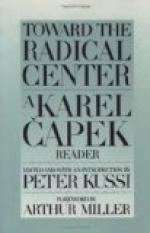|
This section contains 989 words (approx. 4 pages at 300 words per page) |

|
SOURCE: "Karel Capek's Tales of Truth and Detection," in Tribune Books, Chicago, August 21, 1994, pp. 1, 9.
Here, Drew argues that Čapek's "pocket" stories should not be categorized as detective fiction because they focus on larger themes than crime and detection, mainly humanity, justice, and truth.
A generation or two ago, Karel Capek (pronounced "Chopek") was the world's most renowned Czech man of letters, the author of six novels, six plays and many volumes of stories, travel writing, criticism and children's books. Several times nominated for the Nobel Prize, buried among the Czech immortals, Capek achieved instant fame in the 1920s when his play R.U.R.: Rossum's Universal Robots introduced the word "robot" to the languages of the world. But Capek's foreign reputation waned during the 50-year repression of Czech culture by the Nazis and Soviets.
Unlike his countryman Franz Kafka, who wrote very little in the Czech language, and...
|
This section contains 989 words (approx. 4 pages at 300 words per page) |

|


